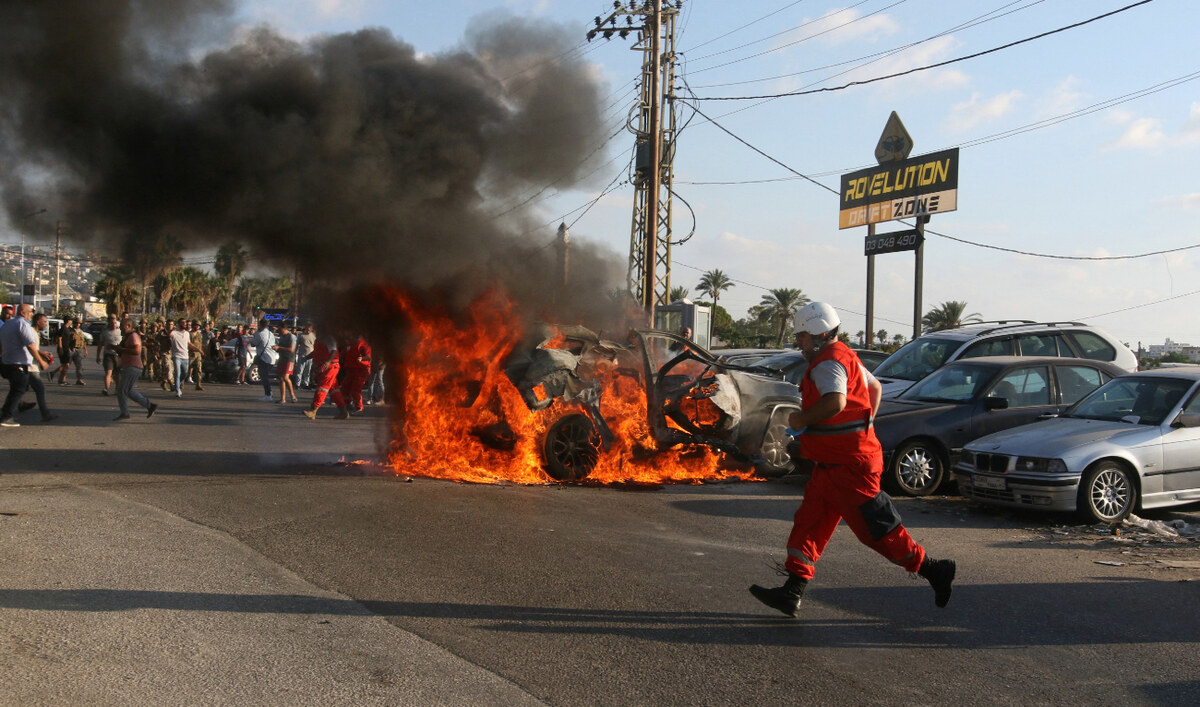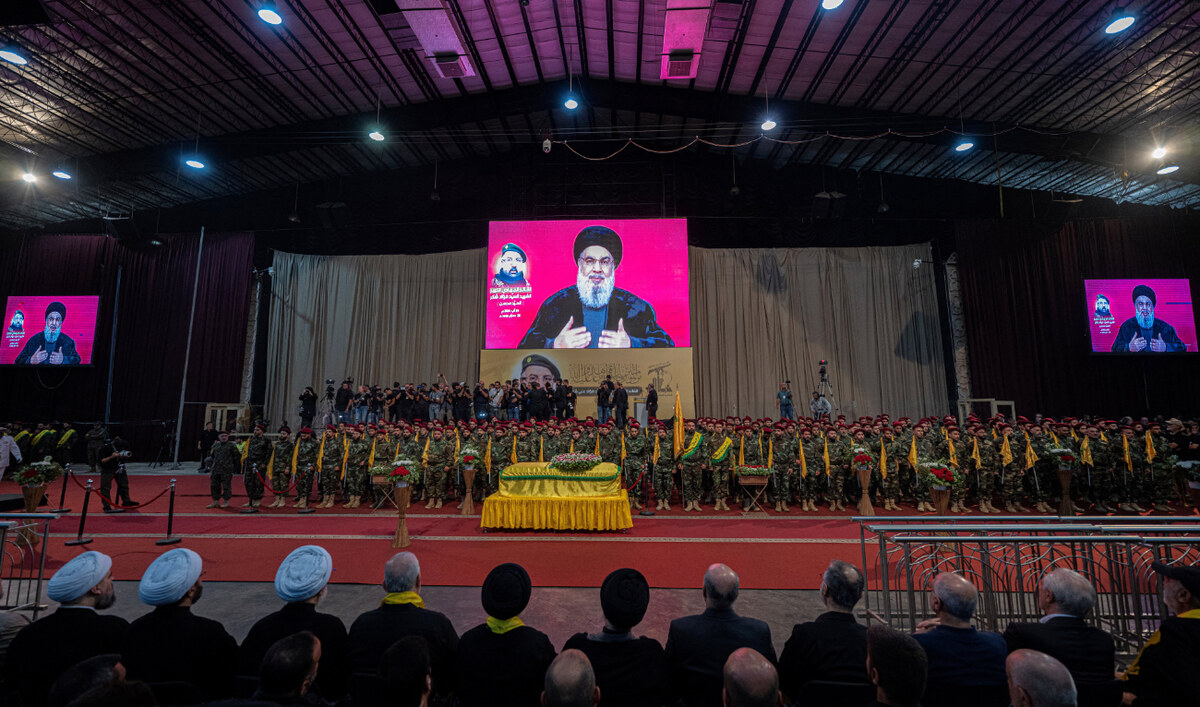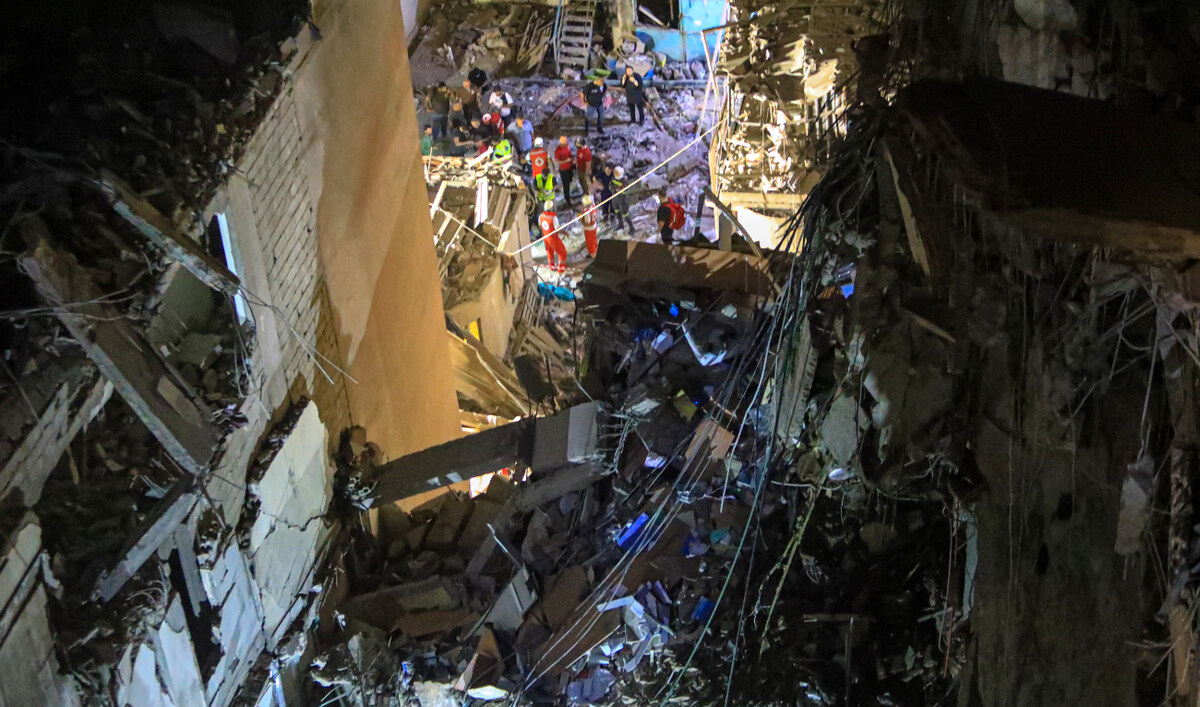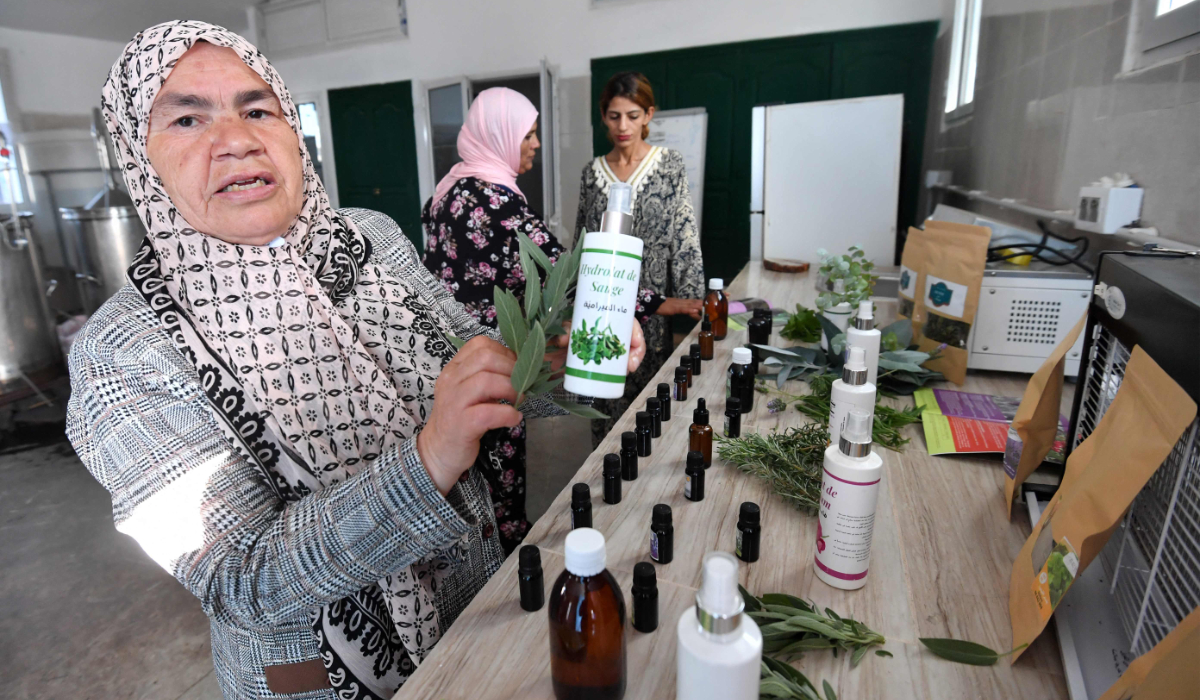BEIRUT: As Lebanon faces the increasing possibility of an all-out war between Hezbollah and Israel, it also confronts a perfect storm of crises, ranging from the economic to the diplomatic.
The Iran-backed Lebanese Shiite group has traded near-daily fire with the Israeli military in support of its ally Hamas since the Oct. 7 attack last year led by the Palestinian militant group on Israel triggered a military assault on the Gaza Strip.

In recent days, calls by Arab and Western governments and embassies for their nationals to leave Lebanon immediately have greatly heightened concerns. The German Foreign Ministry has expressed its alarm at the “false sense of security” among citizens, and warned of severe consequences if the confrontation escalates into a full-scale war.
The US Embassy in Beirut said on Friday that it “encourages those who wish to depart Lebanon to book any ticket available to them” while urging US citizens who choose not to depart Lebanon “to prepare contingency plans for emergencies and be prepared to shelter in place for an extended period.”

Smoke billows from the site of an Israeli airstrike that targeted the outskirts of the southern Lebanese village of Kfar Hamam on August 9, 2024. (AFP)
The risk of the conflict expanding in the Middle East has also led to more airlines, including Air Algerie and Air India, suspending flights to Lebanon. Britain has advised its airlines “not to enter Lebanese airspace from Aug. 8 until Nov. 4,” citing “a potential risk to aviation from military activity.”
Fear of escalation in the wake of two killings at the end of last month attributed to Israel — Ismail Haniyeh in Tehran and Hezbollah’s senior military commander, Fuad Shukr, in Beirut — has driven thousands of Lebanese expatriates to flee the country.
Many had arrived just weeks earlier to spend the summer with family, but now, urged by foreign embassies, they have hastily packed their bags, leaving behind a country on the brink.

Fire sweep over a car targeted by an Israeli strike in the southern city of Sidon on August 9, 2024. (AFP)
“This is Lebanon. Nothing has changed. We are used to it,” said one of the departing expatriates, reflecting the resigned attitude of someone who knew the risks of both staying back in the country and catching a flight out of Beirut.
The exodus of expatriates has struck a devastating blow to Lebanon’s economy. As the primary lifeline that sustains the nation, their departure spells disaster for small and medium enterprises, especially in the tourism sector. Jean Bayruti, secretary-general of the Federation of Tourism Unions in Lebanon, said: “If we sacrifice the tourism sector this year, we will have sacrificed Lebanon.”
Lebanon’s economy, already fragile and weakened by years of political instability, is now at greater risk. The World Bank had cautiously predicted a slight economic growth of 0.2 percent for 2023, supported by remittances and tourism. However, the situation has drastically changed.
The national currency has lost 95 percent of its value since the economy’s collapse in 2019, with more than 80 percent of the population now living below the poverty line.

In recent days, calls by Arab and Western governments and embassies for their nationals to leave Lebanon immediately have greatly heightened concerns. (AFP)
Jassem Ajaka, a Lebanese economist, warned that the low-intensity war in southern Lebanon is eroding the economy. “If the strikes expand, the situation will be more costly, as insurance rates and general prices will rise, and black-market traders will benefit,” he said, referring to operators in the underground economy.
He believes that losses in the Lebanese tourism industry could exceed $2 billion, compounded by disruptions in imports and banking transactions. In the event of an all-out war involving Israeli attacks on Lebanon’s creaky infrastructure, the damage could be catastrophic, Ajaka said.
“Gross domestic product losses could reach 24-25 percent, businesses and hospitals would be affected, and there could be shortages of basic commodities such as wheat and fuel.”
The cross-border violence since last October has killed at least 565 people in Lebanon, mostly combatants, but also at least 116 civilians, according to an AFP tally.
INNUMBERS
- 95% Loss in Lebanese currency value since 2019 economic collapse.
- 80%+ Population of Lebanon now living below the poverty line.
- 565 People, including fighters, killed in Lebanon since October 2023.
On the Israeli side, including in the annexed Golan Heights, 22 soldiers and 26 civilians have been killed, according to army figures. Tens of thousands of residents have been displaced by fighting from both sides of the Blue Line — the demarcation line dividing Lebanon from Israel and the Golan Heights.
Lebanon is deeply divided in its response to the escalating tensions. While some believe that the country can avoid the worst of the conflict, others are already experiencing its harsh realities.
Entire towns in southern Lebanon have been wiped out by retaliatory Israeli military strikes, resulting in the displacement of tens of thousands of families.

A televised speech by Hezbollah chief Hassan Nasrallah is transmitted on large screens as fighters and mourners attend the funeral ceremony of slain top commander Fuad Shukr in Beirut’s southern suburbs on August 1, 2024. (AFP)
On Friday, separate Israeli attacks killed two Hezbollah fighters in Naqoura and two Hamas members in Sidon, including the Palestinian group’s security official in the Ain Al-Hilweh Palestinian refugee camp. It was the first time that the town, 44 km from Beirut, had been targeted.
Israeli drones were seen flying over Lebanese villages along the border, using loudspeakers to broadcast messages in Arabic against Hezbollah and its leader, Hassan Nasrallah. In a televised address at Shukr’s funeral on Aug. 1, Nasrallah said that Hezbollah was “paying the price for its support for Gaza and the Palestinian people,” but also declared an “open battle on all fronts.”
The general consensus in Beirut is that Lebanese government officials have limited options for avoiding a catastrophe. “The most Lebanese officials can do is resort to lobbying diplomacy to prevent Israel from destroying Lebanon,” one analyst, speaking anonymously, told Arab News. “They are unable to influence the course of developments when it comes to Hezbollah and Israel.”

A man walks on an overpass beneath a giant billboard that reads “Enough, we are tired, Lebanon doesn’t want war” on a street in Beirut on August 7, 2024. (AFP)
The situation is vastly different from the 2006 Israel-Hezbollah war, with fewer safe routes for those seeking to flee. Many Lebanese people now consider areas with Christian, Druze, or Sunni majorities as relatively safe, unlike the Shiite-majority regions that are closely associated with Hezbollah.
For many, the threat of war is an all-too-familiar reality. Mohammed Sabra, who lives in Beirut’s southern suburbs, did not try to hide his frustration.
“We are controlled, not chosen. Israel doesn’t need a pretext to attack Lebanon. All I can do is hope for things to stay under control, because I can’t run anywhere. I have five children and displacement will extract a high cost.”
Voicing his concerns, Bilal Ghandour, a jewelry shop owner in Beirut, said: “We are dealing with an enemy that has no red lines, and we saw what happened in the Gaza Strip. The impact of any future war will be severe in light of the economic crisis we are suffering from.”

The aftermath of an Israeli raid in the southern Lebanese village of Shama (Chamaa), on August 2, 2024. (AFP)
In recent weeks, Israeli jets have flown low over Beirut, often visible to the naked eye, and have frequently broken the sound barrier, causing the loudest sonic booms heard in years.
The sense of fear in the Lebanese capital is palpable, especially among residents of areas viewed as Hezbollah strongholds, notably Dahiyeh, a predominantly Shiite suburb in the south of Beirut.
Haret Hreik, in Dahiyeh, was where Shukr was killed in an airstrike by the Israeli military on July 30, in apparent retaliation for the deaths of 12 children in the predominantly Druze town of Majdal Shams, in the Golan Heights, in a missile strike blamed on Hezbollah.
During the 2006 war, Dahiyeh served as the headquarters of Hezbollah and was heavily targeted and damaged by the Israeli military. Dahiyeh doctrine, the Israeli military strategy involving the destruction of civilian infrastructure in order to pressure hostile regimes, is named after the neighborhood.
“Manal,” a university professor who lives in Dahiyeh, shared her apprehensions with Arab News on condition of anonymity. “There is a sense of fear for the family, and I have no plans A or B for displacement. All the bags of displacement are ready in front of the doors of the homes of Dahiyeh residents, even those who believe in the resistance,” she said.

A Lebanese couple run through the streets in front of a bombed bridge following an Israeli air strikes on the Beirut suburb of Dahiyeh on 14 July 2006. (AFP)
Lebanon now faces a future filled with uncertainty. The economic crisis, combined with the potential for war, has left many feeling helpless. “Everyone is worried, everything is possible,” said Fatima Muhaimish, a resident of Beirut’s southern suburbs. “There is no psychological or physical ability to endure war and the horror it leaves behind.”
As the Lebanese people brace for what may come, they are left with more questions than answers. “Is there really a safe place in Lebanon if Israel launches a war on the country?” they ask. “What happens after this war, and will there be other wars?”
Social political analyst Maher Abi Nader attributes the widespread sense of denial to the psychological trauma endured by the Lebanese people in recent decades, most recently after the August 2020 Beirut port explosion.

Rescuers stand near a building with destroyed top floors following an Israeli military strike on Beirut’s southern suburb on July 30, 2024. (AFP)
“The West is ignorant of our reading of the war. The Lebanese citizen knows how to deal with acute crises. He prefers to live one day at a time to avoid fatal stress,” Abi Nader told Arab News.
In his speech at Shukr’s funeral, Nasrallah said that unnamed countries had asked Hezbollah to retaliate in an “acceptable” way — or not at all. But he said it would be “impossible” for his fighters not to respond. “There is no discussion on this point,” he said. “The only things lying between us and you are the days, the nights and the battlefield.”
With no clear path forward, Lebanon is once again on edge, waiting for what seems like a delayed but inevitable full-scale war between Hezbollah and Israel.






































